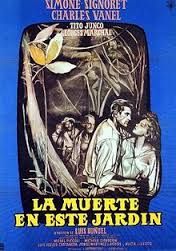
DEATH IN THE GARDEN
France/Mexico, 1956, 96 minutes, Colour.
Simone Signoret, Michel Piccoli, Georges Marchal.
Direcgted by Luis Bunuel.
Death in the Garden is of interest as a '50s work by celebrated writer-director, Luis Bunuel. It is a Mexican- French co-production.
Bunuel, during the '50s, was to make a number of small-budget films in Mexico. They bear the mark of his insights, attitudes (especially towards society and religion) and his having to adapt to the Mexican film industry. The films are somewhat lacking in finesse, especially with his films of the '60s and '70s.
However, this film, made in colour, has an exotic atmosphere of jungle outpost and the isolated lifestyle of miners, prostitutes, missionaries. The film uses the device of throwing a group together, their learning to co-operate and then their bonds collapsing. The film has an excellent cast including Simone Signoret as the prostitute and an arresting
performance by Michel Piccoli as the tormented Father Lizzardi.
1. Interest in the work of Louis Bunuel? This film within the canon of his works? A French- Mexican co production? The French stars? The Mexican locations and the Mexican industry? A film of the '50s?
2. The significance of the title? An English translation as 'Evil Eden'? The emphasis on the physical and psychological environment? Religious overtones? The focus on the small group, society, crises, interaction, power, powerlessness, being trapped, freedom? The group as a symbolic microcosm?
3. Colour photography, the atmosphere of Mexico, the isolated towns, the mines, the jungle, the river? The crashed plane? The musical score?
4. The focus on the mining town, the society, government, clashes between officials and miners, the closure of the mine, the attitudes and behaviour of the military, revolutionary situation? How persuasive a picture of society in ferment? An isolated society - yet symbolic of the wider world?
5. The picture of smugglers, escapees? innocence, crime? The search for meaning in this kind of society?
6. The focus on the garden: reality, symbol, myth? The overtones of the Book of Genesis and innocence and temptation, seduction and death, sin? Knowledge, life and death? A secular parable about religious values?
7. The portrait of the group as a group, the melodramatic behaviour, their interaction? The establishing of sides and loyalties, tensions? Violence and death? The group becoming cohesive, the appeal to their better selves?
8. The discovery of the plane, food, jewellery, wealth? The emergence of greed, selfishness? The collapse of the cohesiveness of the group? The immediate emergence of violence and madness?
9. Chark as focus? His physical presence? A brutal hero, antihero? The film establishing his background, his initial behaviour with Marie? With Djinn? The contrast between the two women and his brutalised behaviour? The clash with the police, Djinn's betrayal, going to prison? The escape, the power, taking over the boat? His establishing himself as leader, laying down the rules, stand-over tactics? The reaction of Castin and Marle? Djinn and the suspicions as well as the sexual attraction? The contrast with Lizzardi and his religious values? The discovery the plane? The wounding of Chark and his carrying Marie to the
10. Marie as the innocent in the garden, the deaf mute girl, a girl of peace? Her experience of the trek, her father and his going berserk? Her surviving? The contrast with Djinn as the prostitute in the town, tough, the night with Chark, betraying him to the police for the wealth, her relationship with Father Lizzardi, trying to escape, the boat, her surviving in the jungle?
11. Castin and his age, tensions, care for his daughter, relationship with Djinn. his finally going berserk and his religious mania?
12. Father Lizzardi, background in the town, relationship with Djinn, religious attitudes, the Bible, the continual presentation of him as ineffectual and offering the Word of God rather than substantial help for surviving in the jungle? A man who could not survive such a journey?
13. The ambiguity of the ending - the prospects for Chark and Marie?
14. Bunuel's view of society, the inherent violence, power struggles, brutalising effect? The experience of human interaction? The film seen as parable, even allegory: brutal hero, innocent virgin, prostitute, priest? Bunuel's personal understanding of human nature. human values, religious values, organised religion? His satiric insights?